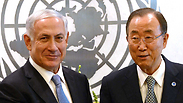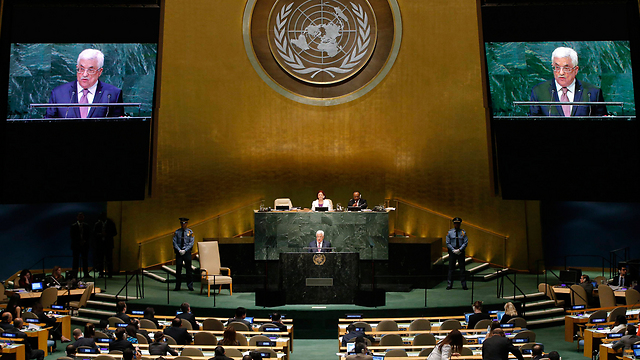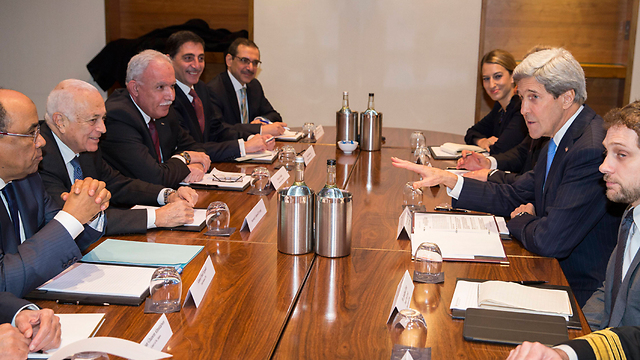
Will US veto UN Palestinian resolution?
Analysis: There are three scenarios for Washington's response to UN recognition request: Convincing Palestinians to postpone it, creating a competing resolution with Israel, and presenting a peace proposal unacceptable to Netanyahu.
Elections are just around the corner, and Washington is waiting to see who will lead Israel.
Meanwhile, the issue of United Nations Security Council recognition of the Palestinian state is also looming.
The groundswell of European countries recognizing Palestine, coupled with the Obama administration's fear of accusations that it is losing its leadership role since it is "being held hostage" by a right-wing Israeli government, have created a situation whereby Washington is no longer committed to using its right of veto to protect Israel.
There are several possible scenarios for what happens next.
This first is that the Americans will ask the Palestinian Authority to postpone their request for a Security Council debate on the issue, which they will be able to justify by citing the upcoming Israeli election.
The Americans will promise Palestinian President Mahmoud Abbas that, if Prime Minister Benjamin Netanyahu also heads the next Israeli government, they will give the green light for the draft resolution to come before the Security Council. If, however, Netanyahu is ousted as prime minister, the United States will seek to promote a peace proposal which incorporates all of the Arab countries – in other words, the Lieberman outline.
If the Palestinians decide that they still want to seek Security Council recognition, the United States will impose a veto. That way, the Obama administration will be able to argue that the Palestinians undermined their own cause.
This is Netanyahu's preferred scenario and it is also the one that Hillary Clinton, who plans to seek the Democratic Party nomination for president in 2016, prefers. Clinton, along with other senior Democrats, is worried about having to compete against a Republican candidate if she has to carry the burden of "Obama's anti-Israel legacy."
On the other hand, senior Democrats said this week that even President George W. Bush committed the United States to the establishment of a Palestinian state some 13 years ago. In fact, they say, Netanyahu also committed himself to the two-state solution in his Bar-Ilan University speech.
According to the second scenario, Netanyahu and Kerry will agree in theory on a watered-down version of the resolution. In other words, they will work together to create a competing resolution to the Palestinian one.
An Israeli-American resolution would mention the "Bar-Ilan vision" and be based on existing American policy, but the process would be spread out over several years and would include clear American demands vis-à-vis Israel's security and recognition of Israel as the national homeland of the Jewish people. This resolution would be presented as an alternative the Palestinian version and the Americans would work to enlist the support of the other members of the UN Security Council.
There seems to be little chance that this scenario will happen but, if it does, Netanyahu will be able to portray it as a great achievement for Israel. It would also allow Obama to claim that it represents a historic American commitment to the establishment of a Palestinian state. In contrast, the Israeli left and the Israeli right would argue that it is yet another failure of historic proportions by Netanyahu.
The third scenario would see the United States presenting a peace proposal unacceptable to Netanyahu and refraining from using their veto in the Security Council. This would represent a new low in Israeli-US relations.
Netanyahu would try to portray himself as the brave soldier on the barricades, trying to hold back the assault singlehandedly, but he would be castigated from every direction as the prime minister who led Israel into the untenable position of international pressure and hostility from our closest ally. If this scenario were to become reality, it would increase Israel's international isolation and would be extremely dangerous.
Elliott Abrams, one of the most senior foreign policy experts from the Republican Party, is banking on the first scenario. "I expect that pressure over the issue of recognition of a Palestinian state will decrease because of the election," he told me this week. "There is every chance that the Palestinians will postpone their request."
In contrast, senior Democrats claim that the second scenario is the most likely. There are those in the Democratic Party who believe that, despite the weakness of the Obama administration, Netanyahu is in even more dire straits – therefore there is a good chance for productive cooperation.
There is, of course, also pressure on Obama not to deepen the rift with the Republican-controlled and hostile Congress, which supports Netanyahu unreservedly. In addition, the second scenario is being seen in Washington as a possible way to breathe new life into the Kerry initiative.
The third scenario is the one that liberals who despise the Israeli right are dreaming of. They are the same people who described Netanyahu as "chickenshit" and who are pinning their hopes on Obama becoming the Palestinians' Truman who will spearhead the United States' historic recondition of the Palestinian state.












